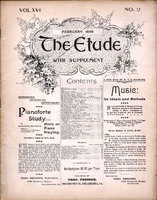Selected Content from the February 1898 Edition of The Etude
Mme. Patti, it is announced, will give a series of concerts in Scandinavia. Marcella Sembrich has signed a contract for twenty concerts in this country next season. The son of Wilhelmj, the famous violinist, is meeting with success as an… Read More
The Listener did not select Mr. Max Heinrich especially because he is a pianist as well as a singer, but because he is one of the few typically musical natures to be found in our professional ranks—not meaning, however, that he is a typical American musician, but that, in every particular, he materializes the spirit of sound, uttering itself poetically and dramatically. Read More
Distorted, degraded, demoralized; sheltering beneath its plausible respectability presumptions of the grossest sort; a scapegoat compelled to answer for every crime in the vocal catalogue; loaded with the stigma of every possible grade of incompetency; a shield behind which ignorance wards off the thrusts of disappointed hopes; a cloak in which charlatanry and pretense enfolds itself and beguiles the unwary and aspiring student into confidences which are followed by despair and wreck;—all because of a name which, except to the few, comprehends only an indefinite significance, even that being borrowed from the faded glories of a remote past and forced into artificial existence in an unnatural and unfriendly soil. The partially equipped status of the vocal profession is accountable for this in part; not less, however, than the credulity of the average vocal aspirant. Our purpose is to answer clearly the question, so frequently put and vaguely answered, “What is the old Italian method?”—and in so doing to settle, beyond cavil and finally, the necessity at least for further impositions—and to remove the mask of mystery surrounding the subject, which has been its greatest charm. Read More
In a recent number of an English Journal Madam Nordica has contributed the first of two articles entitled “Advice to Young Singers.” There is much sound sense in what the gifted vocalist has written, though, of course, some of it is rather obvious—as advice is apt to be. On the other hand, it is precisely the obvious that the student will not notice, of which the following advice on practicing is an example. Read More
It is not an easy thing to explain, in a few words, such a subject as phrasing. Perhaps it will help you if you are referred to the matter of punctuation as used in ordinary writing. Read More
Then there are masculine and feminine pianists and violinists. Paderewski appeals more to women than to men, and d’Albert more to men than to women; Sarasate is particularly a feminine violinist, whereas Joachim and Ysaye are not. In order to disarm gathering indignation, I may as well say that by masculine and feminine I do not refer to the mere accident as to whether a human being is born a man or a woman, but to the essential cast of mind and temperament. Read More
What has the modern music world to give the general public to take the place of the old-time popular cantata for stage representation, a form of entertainment, it is true, crude in inception so far as stage business is concerned, given often without scenery, with nondescript costuming, music of no great value, perhaps, no dramatic contrasts, little or no cohesion of idea and workmanship, yet popular and useful despite all that might be said by way of arraignment? Read More




